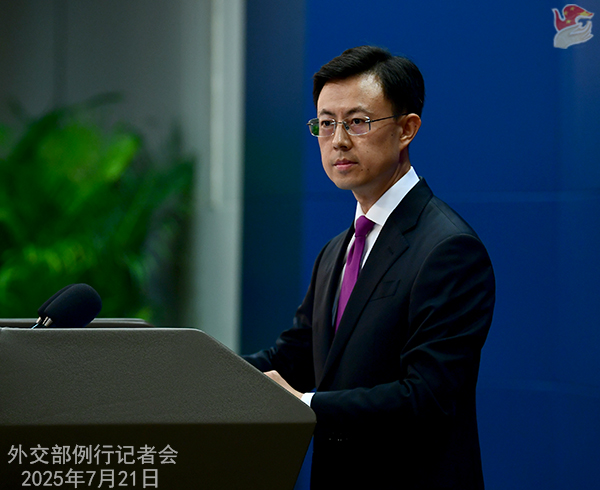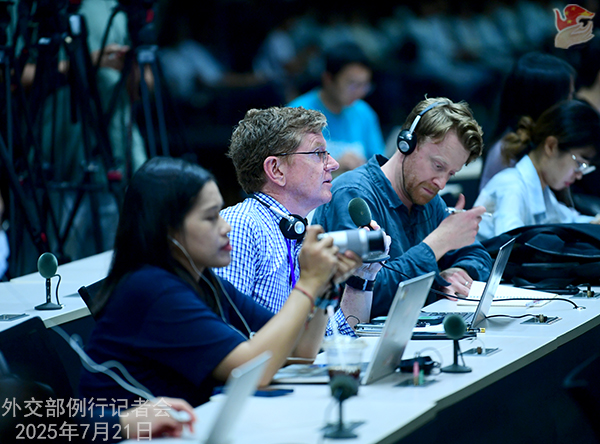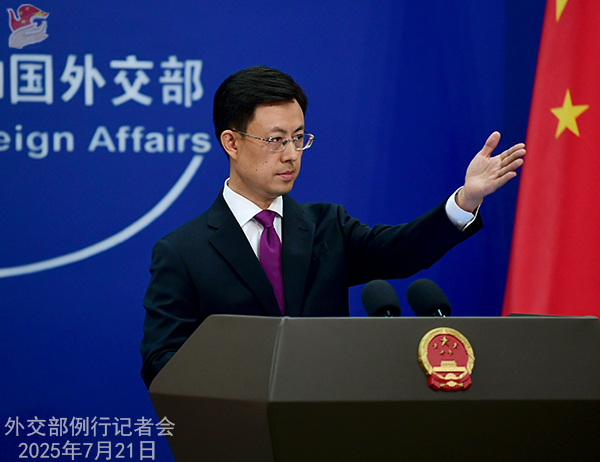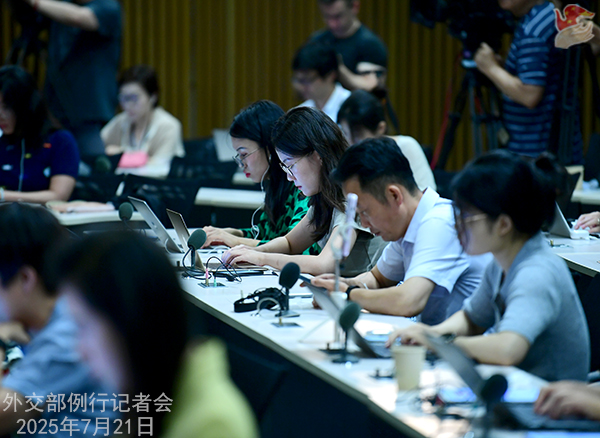
People’s Republic of China


CCTV: To follow up on the upcoming 25th China-EU Summit, what does China expect to achieve through the meeting? How does China view its current relations with the EU?
Guo Jiakun: This year marks the 50th anniversary of the establishment of China-EU diplomatic ties as well as the 80th anniversary of the founding of the UN. As changes unseen in a century are accelerating in a turbulent world, and unilateralism and bullying practices have dealt a heavy blow to international order and rules, humanity once again stands at a critical juncture. China and the EU are two major forces in building a multipolar world, two big markets that support globalization, and two great civilizations that advocate cultural diversity. The upcoming China-EU Summit is of great significance and receives international attention.
Over the past half a century, despite winds and rains, China-EU ties have grown more mature and stable, and become one of the most influential bilateral relations in the world. Bilateral cooperation has borne fruitful results, which gives a boost to each other’s development and progress, delivers tangibly for nearly two billion Chinese and EU people, greatly contributes to world peace and development, and sets an example of mutually beneficial cooperation in the era of economic globalization. Our annual trade volume has jumped from US$2.4 billion to US$785.8 billion. Two-way investment stock has grown from nearly zero to US$260 billion. People-to-people exchanges are more frequent, and effective coordination and cooperation is conducted in climate response and other areas. That said, the relationship does face some challenges. Some in the EU have played up the “partner-competitor-rival” characterization of bilateral relations, exaggerated specific economic and trade issues, and groundlessly accused China on the Ukraine issue, which causes unnecessary disruptions to bilateral relations.
China, as always, believes that after 50 years of development, China-EU ties have accumulated enough experience and positivity, which enables the two sides to navigate difficulties and challenges in an ever-changing world. As the 25th China-EU Summit is around the corner, bilateral relations are at a critical juncture of building on the past achievements and opening up a new chapter. China hopes that the EU will work with China, view its relations with China from a comprehensive, dialectical and forward-looking perspective, draw experience and inspiration from bilateral relations over the past 50 years, follow the trend of the times, meet the expectations of the two peoples and the international community, pool consensus, rise above differences, jointly plan for the cooperation in the next 50 years, and open up a brighter future for the China-EU comprehensive strategic partnership.
Financial Times: European diplomats are saying that China is trying to use the UN80 reorganization of United Nations institutions to increase its influence over the UN, lobbying governments in the Global South to support its ideas. Some Europeans even say China is trying to colonize the UN. What is China’s comment on this?
Guo Jiakun: China attaches high importance to the UN80 Initiative launched by UN Secretary-General António Guterres. We support the UN in responding to the new circumstances and tasks, further reinforcing all parties’ commitment to multilateralism, improving its efficiency through reform, increasing its capability to address global challenges and better playing its role in international affairs. The reform needs full consultation and should take seriously the opinions of UN member states especially developing countries, and build a more just and equitable global governance system.
As two major civilizations and forces, both China and the EU support multilateralism, openness and cooperation, and support the UN’s central role and greater democracy in international relations. China stands ready to work with the EU to take the UN’s 80th anniversary as an opportunity to further strengthen the UN’s central role, enable the UN to function as it should, and provide confidence and driving force for multilateralism.
The Paper: Media reports say that Wells Fargo’s banker named Mao Chenyue was blocked from leaving China in recent weeks. What’s China’s comment?
Guo Jiakun: According to what we’ve learned, Ms. Mao Chenyue is involved in a criminal case currently being handled by Chinese law-enforcement authorities and is subject to exit restrictions in accordance with the law. Pursuant to Chinese laws, with the case still under investigation, Ms. Mao cannot leave the country for the time being and has an obligation to cooperate with the investigation. Anyone, Chinese and foreigners alike, should abide by Chinese laws in China. We will protect Ms. Mao’s lawful rights and interests during the investigation in accordance with the law. Let me stress that it is an individual judicial case. China will as always welcome people from all countries to travel and do business in China and ensure their rights and interests in accordance with the law.

The Australian: About the Australian prime minister’s trip to China last week, it finished on Friday. What was the Chinese government’s reaction to the trip?
Guo Jiakun: Regarding the relevant events of Australian Prime Minister Albanese’s visit to China, the Chinese side has put out readouts and you may refer to that. Let me say that during Prime Minister Albanese’s visit here, the leaders of both sides reached important consensus on further deepening and expanding mutually beneficial cooperation. China stands ready to work with the Australian side to strengthen the planning and design for cooperation in various sectors, enhance communication and exchanges at different levels and make greater effort for mutual benefit at a higher level that better serves the interests of both peoples.
The Australian: During the trip, the prime minister had lunch after his official meeting with President Xi in the Great Hall. Now the Australian prime minister thought that was very significant, but I wonder what does the Chinese government think?
Guo Jiakun: During Prime Minister Albanese’s visit here, the Chinese side made relevant protocol arrangements for an official visit. I believe that every activity is significant and has contributed to advancing the steady growth of China-Australia relations.
AFP: The Gaza civil defense agency said yesterday the Israeli forces killed at least 93 people who were trying to collect food and humanitarian aid. I just wondered if the Foreign Ministry would like to comment on this incident.
Guo Jiakun: China is closely following what is happening in Gaza. We oppose and condemn all moves that harm civilians and violate international law. Civilians must not become the target of attacks, and the safety of international humanitarian workers must not be threatened. We call on parties to reach a ceasefire, realize deescalation, and alleviate the humanitarian crisis as soon as possible.
Bloomberg: Multiple news outlets have reported that China has stopped an American citizen who works for the U.S. Commerce Department from leaving the nation over a failure to disclose that the person was working for the U.S. government on a visa application. I’m wondering if the Foreign Ministry has any comment on this case.
Guo Jiakun: I have no details to share. China upholds the rule of law and handles entry and exit affairs in accordance with the law.
Kyodo News: Japan’s ruling coalition lost its majority in the recent elections to select members of the House of Councillors. What is China’s comment?
Guo Jiakun: China noted relevant results. This is Japan’s internal affairs, and I have no specific comment. China and Japan are neighbors. The sound and steady growth of bilateral relations is in the fundamental interests of the two countries and two peoples. China stands ready to work with Japan to continue dialogue and communication at various levels and in multiple fields, enhance political mutual trust, deepen mutually beneficial cooperation, properly handle differences, jointly promote the China-Japan strategic relationship of mutual benefit in an all-round way, and build a constructive and stable relationship that meets the requirements of the new era.
The Australian: Prime minister Albanese had meetings with Chinese leaders. About his election commitment to end the ownership by Chinese company of the port of Darwin, a subject I’ve read you and your colleagues speak about before, he said that didn’t come up directly in the meeting, although Premier Li did—and in the public part of the meetings—speak about the business environment and the treatment of Chinese investment in Australia. On the situation with the port of Darwin, is the Chinese government still concerned about that situation or are you at peace with it?
Guo Jiakun: Let me stress that the Chinese company got the lease of Port Darwin through market means. The company’s lawful rights and interests should be fully protected.

Financial Times: Just regarding the U.S. Commerce Department employee who has received an exit ban in China. U.S. embassy has said that these exit bans damage bilateral relations. What is China’s comment on that?
Guo Jiakun: I have answered relevant question just now.
Reuters: There have been several reports suggesting the Chinese and U.S. presidents would likely meet in the coming months. Are preparations for such a meeting underway? Can you reveal any more details? Also, are there any conditions under which China would like the U.S. to meet before such meeting takes place?
Guo Jiakun: Head-of-state diplomacy plays an irreplaceable strategic role in guiding China-U.S. relations. On the specifics you mentioned, I have nothing to read out at the moment.
Bloomberg: The EU sanctioned two Chinese banks and five companies on Friday as part of the latest round of sanctions against Russia. I’m just wondering if you have any further comments on this specific case.
Guo Jiakun: Spokesperson of the Ministry of Commerce made a response on this. Let me stress that China opposes any unilateral sanctions that have no basis in international law or the authorization of the UN Security Council. On the Ukraine crisis, China has been committed to promoting peace talks. We never provide lethal weapons to any party to the conflict, and strictly control the exports of dual-use items. The normal exchange and cooperation between Chinese and Russian companies should not be disturbed or affected. We urge the EU to stop harming the lawful interests of Chinese companies without any factual basis. China will do what is necessary to firmly safeguard the legitimate and lawful rights and interests of Chinese companies.
The Australian: Next month, it’ll be one year since I’ve been back in Beijing. That ended four years when there were no Australian correspondents from Australian media in China. Can you tell me is another Australian correspondent gonna be allowed to be based here?
Guo Jiakun: We welcome you to return to Beijing and, as an Australian correspondent, report on China’s foreign policy and relevant practice of Chinese modernization. We hope that you will help the Chinese and Australian people learn more about and have a better understanding of each other. We believe that as the China-Australia relations grow and develop, our media cooperation will also make progress. We look forward to welcoming more Australian correspondents to China.
The Australian: On the last trip, the Australian prime minister went for a walk on the Shanghai Bund and was called a “handsome boy.” But on this trip there was no reference to the prime minister being a handsome boy. Has the government changed its assessment on prime minister’s physiques?
Guo Jiakun: China’s stance on developing its ties with Australia is consistent and clear. We welcome Australian leaders to pay more visits to China and contribute to the bilateral cooperation in various fields.
RIA Novosti: The Iranian foreign ministry announced earlier that Iran, France, Germany, and the United Kingdom will hold talks on the Iranian nuclear issue in Istanbul on Friday, July 25 at the level of deputy foreign ministers. I wonder what’s China’s comments on this development around the Iranian nuclear issue?
Guo Jiakun: The Iranian nuclear issue bears on the peace and security of the Middle East and the international nuclear non-proliferation regime. China always advocates resolving the Iranian nuclear issue peacefully through political and diplomatic means. This is the only right way forward. We call on relevant parties to work in the same direction for bringing the issue back to the track of political settlement.




